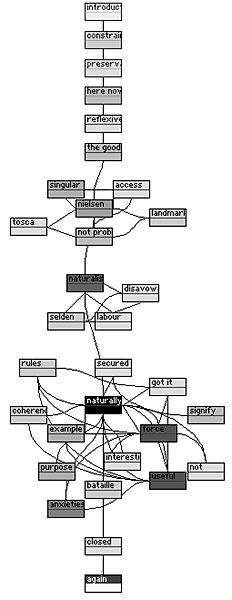
|
Usability
In the rise of the World Wide Web as a hypertext environment "usability" and "navigation" have figured as problems of concern to the academic hypertext community (Bernstein "Intertwingled", "Beyond Usability"). The insights offered in the work of seminal hypertext theorist George Landow in his 1994 essay on rhetoric and hypermedia has defined for many the problems that linking poses for readers and writers in terms of usability and navigation, concerns that are strongly reiterated in the work of influential contemporary information architect Jakob Nielsen. In his Designing Web Usability, Nielsen has suggested that Web design needs to emphasise simplicity and clarity, and that links, as the fundamental units of Web authoring, ought to be largely transparent to users. This can be described as an "economy of transparency" and I'd suggest this "economy" is the hypertextual equivalent of literary realism .
Ideology
Terry Eagleton, when discussing Roland Barthes' semiotics of literature, has characterised realism as any discursive system which seeks to naturalise its forms of utterance. For Eagleton, via Barthes, such a naturalisation is and can only be the work of ideology, of an effort to conceal the work or labour of a representational system to generate meaning.
Force
A close analysis of Landow's justly celebrated essay, "The Rhetoric of Hypermedia," helps show that usability, when applied to hypertext, is a realism of link rhetorics that, as in Eagleton's criticism of literary realism, naturalises and conceals the force of the hypertext link. The force of the link in hypertext falls beyond the conceptions of a rhetorics to the extent that links are nonlinguistic.
|